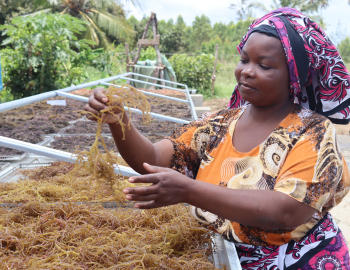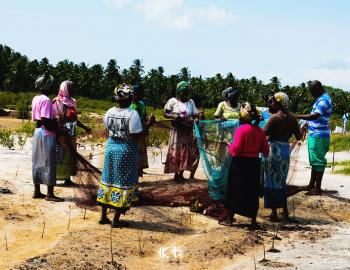From low-carbon consumers to climate leaders
From low-carbon consumers to climate leaders
The world is currently at 1.15°C of warming above pre-industrial levels, and this warming has already driven more frequent and intense weather extremes, as well as slow-onset changes, which affect the poorest and most disadvantaged in society the most. State and non-state actors are pivoting toward net zero carbon economies in response to the goals of the Paris Agreement on climate change, which commits countries to holding average global temperature rise to 2°C above pre-industrial times, and as close to 1.5°C as possible. The economic transformations required will change the world of work with some jobs no longer being climate-compatible and will discontinue. New opportunities for low-carbon work are already emerging and will continue to do so.
Connected to these economic transformations is an important gender dimension. Today, women are behind men on measures of economic empowerment. More women than men are in informal, insecure, paid work. Progress in closing the economic gender gap has stalled in recent years and the Sustainable Development Goal (SDG) 5 for gender equality is still far from being met. There is a risk that pursuing low-carbon transitions in a gender-blind way could further widen, not narrow, the gender development gap. Women’s economic empowerment must be integrally mainstreamed in the global transition to a net zero economy.
This report, for the GLOW programme, reviewed academic and grey literature and related policy debates to ascertain whether women’s economic empowerment has been integrated into discussion of low-carbon transitions.
The research report aimed to:
- establish what evidence already exists on the intersections between women’s economic empowerment and low-carbon transitions and where there are gaps
- identify how the GLOW projects are contributing to gaps in the evidence base
- recommend how GLOW and other research initiatives and funders may further enrich evidence on the intersections, and inform policy and practice.
The central questions guiding the study are:
- To what degree are low-carbon trajectories and women’s economic empowerment integrated in the literature?
- To what degree are low-carbon development policies and their implementation being linked to women’s economic empowerment in policy and practice? What is the evidence?
Key messages emerging from the study include:
- Until now, there has been a general lack of integration of women’s economic empowerment in low-carbon transitions at economy-wide level.
- Discussion of gender issues and people’s intersectional vulnerabilities (such as age, ethnicity, class, caste, disability) is superficial in the influential literature on the economics of climate change mitigation, which are often framed as ‘green economies’ or ‘green growth’. There is an immediate opportunity – indeed, an urgency – to address this gap.
- A body of transversal feminist literature on gender and climate change has been deeply important for its focus on women’s participation in climate-related decision-making. Its leading scholars and advocates have been successful in strengthening attention on gender issues in United Nations Framework Convention on Climate Change (UNFCCC) processes. This work, however, provides a shallower treatment of other aspects of economic empowerment and has been strongly biased toward women’s roles in adaptation. The climate change mitigation component has been small by comparison.
- Since the signing of the Paris Agreement in 2015, global policy discussions and grey literature have strengthened around the concept of ‘just transitions’. The ‘just transitions’ focus is about compensating workers who are employed in fossil-fuel-extractive or fossil-fuel-dependent industries, by training and redeploying them to more environmentally sustainable jobs. It has tended to be biased toward male-dominated, polluting industries in the Global North. More nuanced analyses have not yet translated adequately into global policy frameworks, such as the UNFCCC decision texts on ‘just transitions’. Hence, until recently, there has been little widespread discussion of how workers who start in the most disadvantaged positions, including women, informal sector, and rural workers in the Global South, can progress into more secure, low-carbon employment. Recently, coalitions of organisations and feminist thinkers based in the Global South have sought to address this gap and reframe the previous biases.
- Some of the boldest thinking on the interlinkages between women’s economic empowerment and low-carbon transitions is seen in the sectoral literature and especially in the agriculture, forestry and agroforestry domains. This study also highlights that some of the most cutting edge, integrative work on the frontier of women’s economic empowerment and low-carbon transitions is in a small number of governmental climate policies.
Who should use this report?
This report is geared primarily toward students, academics, researchers and research funders who are interested in where the innovative thinking and practice lies, and how GLOW’s original research will fit into the existing evidence base.
An accompanying policy brief to this report, Women's economic empowerment: the missing piece in low-carbon actions and plans, by M. Dupar and E. Tan (2022) (in English, French and Spanish) contains specific recommendations for government and business leaders on changes they could make to policies and investments.
Download the report here.



